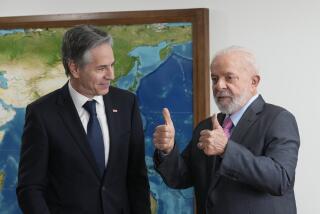Outside and Inside Aid for Brazil
- Share via
Brazil, South America’s economic giant, has fallen into a financial whirlpool that threatens its hemispheric neighbors and its own political stability. Part of the problem is excess. Brazilians spend more than they earn, and the country now faces a budget deficit of 7% of the gross domestic product, plus short-term domestic debt of $300 billion. By the numbers, Brazil is broke.
Brazil’s problems are not entirely of its own making; blame falls on the world’s volatile financial markets too. In the aftermath of September’s economic collapse in Russia, foreign investors pulled $1 billion a day out of Brazil, reducing the country’s foreign currency reserves from a comfortable $73 billion to half that amount.
Faced with the mounting crisis, President Fernando Henrique Cardoso last week announced a three-year, $80-billion austerity package of spending cuts and new taxes that looks good on paper but, by itself, won’t be enough. What Brazil needs is access to an emergency credit source like the International Monetary Fund to restore the confidence of foreign investors, and it’s coming online. The IMF, the U.S. Treasury and the leaders of the G7 countries are putting together a package that would extend a line of credit of $30 billion to $45 billion. That’s a start, a whopping one, but considering the importance of Brazil a decision that had to be taken.
The task ahead for Cardoso is difficult. First and foremost he must persuade his nation’s Congress to swiftly approve the rest of his economic belt-tightening package. Then he has to persuade several newly elected state governors to limit spending. That won’t be easy for politicians who made promises on the campaign trail. But failure to act could cause serious harm not only to Brazil but to countries like Argentina that depend on Brazilian trade.
Cardoso scored an initial reform victory Wednesday, albeit a small one, when the lower house of the Congress gave initial approval to part of a long-delayed reform bill designed to plug huge losses in the country’s bloated pension system. More and tougher actions, including tax increases, are needed to restore foreign confidence in the economy, but Cardoso has at least broken the reform logjam.
The assistance of the international financial community should be conditioned on Cardoso winning legislative passage of his reform package. The Brazilians must understand the depth of their problem and take steps to reverse it.
More to Read
Sign up for Essential California
The most important California stories and recommendations in your inbox every morning.
You may occasionally receive promotional content from the Los Angeles Times.













